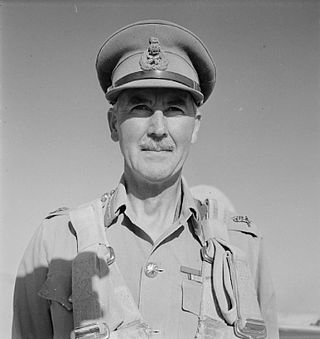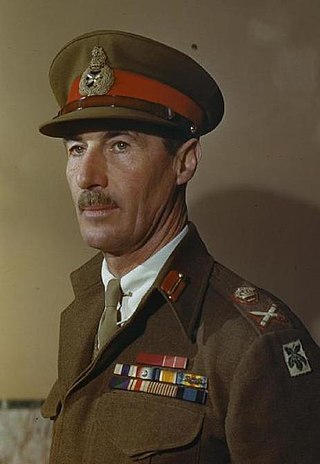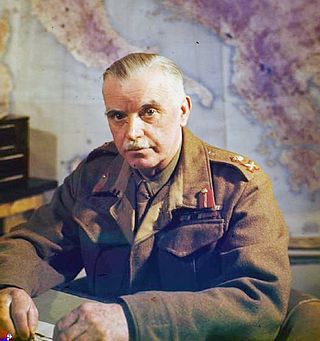
Field Marshal Alan Francis Brooke, 1st Viscount Alanbrooke,, was a senior officer of the British Army. He was Chief of the Imperial General Staff (CIGS), the professional head of the British Army, during the Second World War, and was promoted to field marshal on 1 January 1944. As chairman of the Chiefs of Staff Committee, Brooke was the foremost military advisor to Prime Minister Winston Churchill, and had the role of co-ordinator of the British military efforts in the Allies' victory in 1945. After retiring from the British Army, he served as Lord High Constable of England during the Coronation of Queen Elizabeth II in 1953. His war diaries attracted attention for their criticism of Churchill and for Brooke's forthright views on other leading figures of the war.

General Sir Alan Gordon Cunningham,, was a senior officer of the British Army noted for his victories over Italian forces in the East African Campaign during the Second World War. He then commanded Eighth Army in the desert campaign, but was relieved of command during the Crusader battle against Erwin Rommel. Later he served as the seventh and last High Commissioner of Palestine. He was the younger brother of Admiral of the Fleet Lord Cunningham of Hyndhope.

Middle East Command, later Middle East Land Forces, was a British Army Command established prior to the Second World War in Egypt. Its primary role was to command British land forces and co-ordinate with the relevant naval and air commands to defend British interests in the Middle East and eastern Mediterranean region.

Operation Unthinkable was the name given to two related possible future war plans developed by the British Chiefs of Staff Committee against the USSR during 1945. The plans were never implemented. The creation of the plans was ordered by British Prime Minister Winston Churchill in May 1945 and developed by the British Armed Forces' Joint Planning Staff in May 1945 at the end of World War II in Europe.

Sir Reginald Aylmer Ranfurly Plunkett-Ernle-Erle-Drax, KCB, DSO, JP, DL, commonly known as Reginald Plunkett or Reginald Drax, was an Anglo-Irish admiral. The younger son of the 17th Baron of Dunsany, he was Director of the Royal Naval Staff College, President of the Naval Inter-Allied Commission of Control in (Berlin), commander-in-chief of successive Royal Navy bases. His brother Edward, who became the 18th Baron of Dunsany, was best known as the famous playwright and author Lord Dunsany. Edward inherited the paternal estates in Ireland, while Reginald was bequeathed most of his mother's inheritance across portions of the West Indies, Kent, Surrey, Dorset, Wiltshire and Yorkshire. He extended his surname by special Royal licence in 1916, and was noted for the quadruple-name result, Plunkett-Ernle-Erle-Drax.

Lieutenant General Herbert William Lumsden, was a senior British Army officer who fought in both the First and Second World Wars. He commanded the 1st Armoured Division in the Western Desert campaign, and later commanded the X Corps at the Second Battle of El Alamein, before being relieved by his superior, Lieutenant General Bernard Montgomery. He was killed in action by the Japanese in early 1945, becoming the most senior combat casualty of the British Army of the Second World War.

Lieutenant-General Sir Ronald MacKenzie Scobie, was a senior British Army officer who fought in both the First and Second World Wars, where he commanded the 70th Infantry Division and later III Corps. He was also a Scotland international rugby union player.
Lieutenant-General Sir Noel Monson de la Poer Beresford-Peirse KBE, CB, DSO was a British Army officer.

General Geoffrey Kemp Bourne, Baron Bourne, was a British Army officer.
Major General Edward Bailey Ashmore, was a British Army officer from the 1890s to the 1920s who served in the Royal Artillery, the Royal Flying Corps and briefly in the Royal Air Force before founding and developing the organisation that would become the Royal Observer Corps.
Lieutenant General Sir Roderick William McLeod, was a British Army officer who achieved high office in the 1950s.

General Sir William Duthie Morgan, was a British Army officer. During the Second World War, he commanded the Mediterranean Theatre of Operations during the late stage of the war.

Lieutenant-General Sir Otto Marling Lund was a senior British Army officer who served as General Officer Commanding-in-Chief Anti-Aircraft Command.

Major-General Sir John Noble Kennedy, was a senior British Army officer who served as Assistant Chief of the Imperial General Staff during World War II.
Lieutenant General Sir William Gregory Huddleston Pike was a senior British Army officer who served as Vice Chief of the Imperial General Staff from 1960 to 1963.
Major-General Geoffrey Herbert Anthony White was a British Army officer who became Commandant of the Royal Military Academy, Woolwich.

Lieutenant General Sir Wilfrid Gordon Lindsell was a senior British Army logistics officer in the Second World War.

Major General Stuart Blundell Rawlins, was a senior British Army officer during the Second World War.
Colonel Sir Charles Sim Bremridge Parsons, was an officer in the British Army, who spent most of his career serving in the African continent.

Milo George Talbot CB was a British Army officer. The son of the 4th Baron Talbot of Malahide, he was born into an Anglo-Irish family and attended Wellington College and the Royal Military Academy, Woolwich before being commissioned as an officer in the British Army's Royal Engineers. He played a single match of first-class cricket as a young man for the Gentlemen of the South against the Players of the North. Talbot served on the staff of General Ross during the Second Anglo-Afghan War and remained in that country as a member of the Afghan Boundary Commission. He returned to Britain as a staff officer before returning to active duty during the Anglo-Egyptian conquest of Sudan. During this time he was present at the Battle of Omdurman and served on secondment to the Egyptian Army as a Major-General. Talbot retired in 1905 but was recalled to duty during the First World War when he gave advice on plans for the Gallipoli Campaign and the defence of Sudan.















